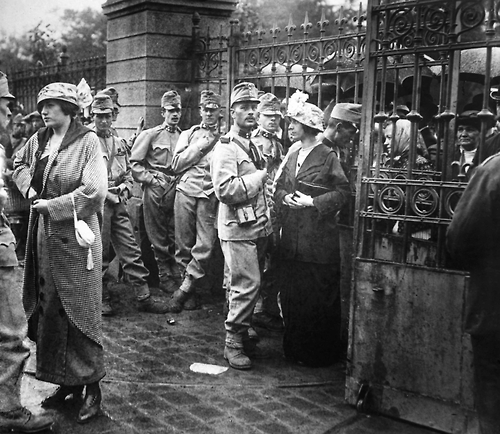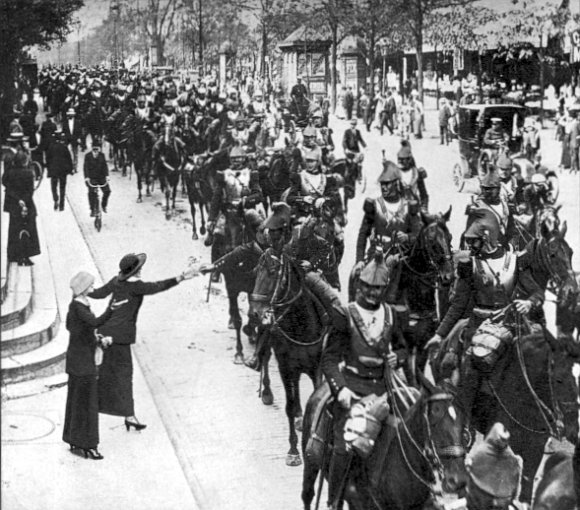The Great War Begins: The 10 Most Resonant Moments August 2, 2014
Author: Beach Combing | in : Contemporary , trackbackHistorical anniversaries are not normally to Beach’s taste. They vulgarise, they trivialise, they misstate…. Like an ardent monarchist who can’t stand royal weddings he would be anywhere but there when the minister appears with the scissors for a ribbon and a vapid speech. But this blogger has been filled with a sense of awe as the clock hands have turned round the last days, something he had never previously experienced (perhaps senses heightened by coming out of a fever). Here are ten moments in chronological order. And the best? The unofficial no. eleven though frustratingly the reference remains elusive.
(1) 28 July: Street parties in Vienna as war declared on Serbia and Viennese men say goodbye to their families and fiances (pictured).
(2) 30 July: Tsar Nicholas II hesitating up until the end before approving mobilization (Sazonov’s account): ‘to fight means to sentence hundreds of thousands of Russians [ed: including your entire family] to death: how can one not shrink from this?’
(3) 1 August: The last telegram from the Tsar to the Kaiser (part of the so-called Willy-Nicky correspondence) ends on a trusting, desperate note: ‘Anxiously, full of confidence await your answer’. The Tsar was a nice man, but he didn’t get it.
(4) 1 August: Ambassador Pourtales gives the German declaration of war to the Russian Foreign Secretary Sazonov with shaking hands and then bursts into tears: the two men – both decent and both more capable than their masters – embrace.
(5) 1 August: In the evening an ‘accidental’ German incursion into Luxembourg to take up railways tracks: the German high command had forgotten to tell some units that the attack in the west had been delayed!
(6) 1 August: The Editorial in The Economist. Britain’s greatest news publication (and usually a staid one) suddenly realizes there is going to be a world war. (There is something magical about the British catching on late… ) ‘The financial world has been staggering under a series of blows such as the delicate system of international credit has never before witnessed… Nothing so widespread and so world-wide has ever been known before.’
(7) 2 August: at about 10.00 am the first German-French melee takes place at Jonchery (before the declaration of war!), the first German and French corpses are, then, laid down side by side.
(8) This amazing photograph of French heavy cavalry (wth!) riding through Paris: note the source uncertain and so the date may be slightly off (though not by much to judge by the scene).
(9) 3 August: Lord Grey, keen birdwatcher and sometime British foreign secretary, watches the gas lights being put on in the Mall and gives one of the most memorable quotations of the twentieth century.
(10) 4 August: Albert I, Belgium’s most impressive king (if only he’d been the Tsar or Kaiser in 1914), speaks defiance to the Belgian Parliament as news comes in that German soldiers have crossed the frontier.
All of these have that classic WIBT (wish I’d been there) potential: they resonate, they represent and they move. But the greatest moment of them all? Beach can’t find it at present (go easy on me I took half an hour to find the Nicholas II quotation above) but there is
(11) an extraordinary Belgian nose-witness description of the body odour of thousands of German soldiers marching through a town, a smell that stayed in the air for hours after they had passed. This is not to reduce the German army, going Schlieffen-wards, to orcs in Middle Earth: heaven forbid. It is to remember that behind all the glory, straw-hats, honour and fanfares of July and August 1914 there were grunts and body fluids and millions of litres of blood ready to spill.
Can anyone beat that WW1 starting moment: drbeachcombing AT yahoo DOT com




